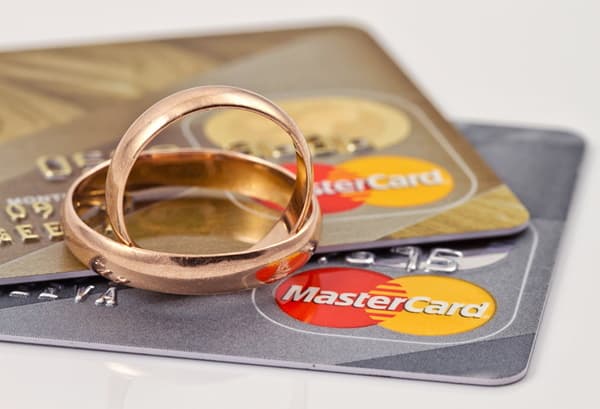Protecting Your Credit During Divorce
By Tracy Achen
Taking steps to protect your credit during divorce should begin when you first separate or start thinking about getting a divorce.
Since your financial future depends in part on a good credit standing, how you handle yourself during the actual divorce can make a big difference. Below you will find tips for handling your finances that will go a long ways towards protecting your credit.
Handling Joint Debts

Since joint credit accounts are the responsibility of both spouses, you need to find out just what you are liable for.
One way to get a clear idea of your joint debts is to order your credit report. Not only will you discover the debts that belong to both you and your spouse, but also those accounts that belong solely to you. The easiest way to do this is through AnnualCreditReport.com. This site was created by the credit bureaus to comply with the FACT and offers consumers a free copy of their credit report.
You need to pay special attention to your joint credit obligations that your spouse has access to. These can include mortgages, home equity lines of credit, finance and auto loans, credit cards, and bank loans. If you are worried that your spouse may open credit cards in your name, you might consider using a credit monitoring service. These services will notify you anytime there is a change to your credit history, whether it's due to new accounts being opened or large charges on old accounts.
Close Joint Accounts if Possible
Ideally, you should close all your joint credit accounts that don't have an account balance. To close a joint account, call the bank or creditor to request that the account be closed. Take notes of your conversations, including times, dates and contact names, and write down any instructions the creditors gives you. Make it clear that you will not be responsible for any further charges as of the day you call.
You will also want to follow up with a letter stating that you want the account closed, and keep a copy of the letter for your own records. If the creditor lets you close the account, ask that they report that the account was closed at your request to the credit bureaus.
It's important to note that closing a joint account that has been open for years will probably affect your credit during divorce. But this drop in your credit score is only temporary and your score should go back up as you begin to establish credit in your own name.
Freezing Accounts that Can't Be Closed
Most creditors won't let you close an account that has an outstanding balance. In these instances, you should request that a freeze be placed on your account to prevent future charges. Even though you will still be jointly responsible for the existing balance, no further debt can be added to the account.
Remove Your Spouse as an Authorized User
One thing most people over-look when getting divorced is to remove their spouse as an authorized signer on their credit card account. In these situations, the credit card is solely in one person's name, but their spouse has "permission" to charge on the account. Unfortunately, the spouse that has permission to charge to the credit account generally isn't held liable for the amount charged (unless they live in a community property state). In a community property state (AZ, CA, ID, LA, NV, NM, TX, WA, and WI), both spouses are responsible for any debt acquired during the marriage.
Failing to remove your spouse as an authorized user can open the door to your ex going on a spending spree at your expense. But it's easy to prevent this type of scenario. Simply call the credit card company and request that your spouse be removed as an authorized user.
Keeping Current on All Joint Accounts
It's important to make sure that all joint accounts get paid on a regular basis when you're going through a divorce. Since divorce negotiation can go on for months, all it takes is one late payment on a joint account to hurt your credit (it can drop your score from 20 to 75 points). Even if your spouse is assuming the debt, your credit will still suffer if the account isn't paid on time every month (which can prevent you from getting credit on your own).
One thing that many people over-look is the utility bills that are in both spouse's names. Logically, these bills should be put in the name of the spouse that will be keeping the house.
Close Joint Bank Accounts
Since most couples share a checking (and possible a savings) account, you will need to see about having these closed, especially if you have over-draft protection. Just imagine how it would feel to be hit with huge over-draft fees when your spouse decides to go on a spending spree with no regard to the account balance. While it may be tempting to try and remove your spouse's name from the account, you need to realize that most banks won't do this because the accounts are approved based on the information from both spouses credit reports.
Since joint bank accounts are considered a marital asset to be divided in the divorce, the ethical thing to do is close the account and give your husband half of the proceeds. If you don't, just realize that you may have to pay this money back in your settlement agreement. Check out the following article for more information: Divorce & Bank Accounts.
Establishing Your Own Credit During Divorce
Some women haven't established much of a credit history, especially if their husband was the main income earner for the family. And this can put you at a disadvantage when you start to rebuild your life after divorce. Having no credit history or a low credit score can make it hard to qualify for such things as bank and auto loans, renting a new house or apartment, or even meeting the requirements for some jobs.
If you don't have credit established in your own name, you should consider applying for your own credit card before the divorce is finalized. It is often easier to get credit during divorce rather than after your divorce is finalized. If you aren't currently employed, it may be difficult to qualify for a traditional credit card in your own name, but there are still options.
Probably the best option if you don't qualify for a regular credit card is a secured credit card. This is a type of credit card in which you deposit a set amount of money with a lender to "guarantee" that you'll repay what is charged on the credit card. Generally, your credit limit will equal the amount you deposited to secure the card and your card activity will be reported to the credit bureaus. And some accounts will convert to a regular credit account if you make on-time payments for a certain amount of time, further building your credit score.
In addition to these steps for protecting your credit during divorce, you can also learn more about debt responsibility, rebuilding your credit, and more:


